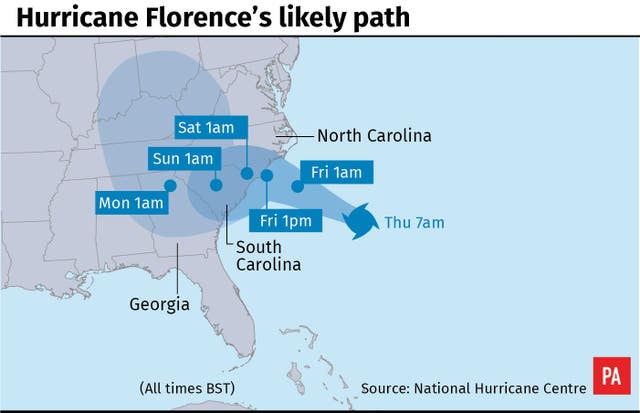US emergency officials have warned “time is running out” for people to escape from Hurricane Florence as outer bands of wind and rain began lashing North Carolina.
Florence’s winds have dropped from a peak of 140mph to 105mph, reducing the hurricane from a Category 4 to a Category 2.
But forecasters warned that the widening storm — and the likelihood of it lingering around the coast for days — would bring seawater surging on to land and torrential downpours.
Federal Emergency Management Agency administrator Brock Long said storm surge warnings have not changed despite the weakening intensity of the winds.
He urged people in the coastal Carolinas and living near inland rivers to evacuate. “Please heed the warnings,” Mr Brock said: “Your time is running out.”

Forecasters said Florence’s eye could come ashore early on Friday around the North Carolina-South Carolina border. Then it is likely to hover along the coast on Saturday, pushing up to 13ft of storm surge.
Rain bands from #Florence are already well inland. This is just the beginning of a very long-duration, potentially-catastrophic flooding event well-inland.Keep up with the latest forecast at https://t.co/VyWINDk3xP, and obey orders from emergency management as this unfolds. pic.twitter.com/G8uUGrRyfK
— NWS (@NWS) September 13, 2018
The forecast suggests as much as 40in of rain over seven days along the coast, with the deluge continuing even as the centre of the storm pushes its way over the Appalachian Mountains.
The result could be what the Houston area saw during Hurricane Harvey just over a year ago – catastrophic inland flooding that could swamp homes, businesses, fields and industrial sites.
The result could be catastrophic inland flooding that could swamp homes, businesses, fields and industrial sites.
Damaging hurricane-force winds are likely along portions of thecoasts of South Carolina and North Carolina as soon as this evening,and a Hurricane Warning is in effect. Strong winds could also spreadinland into portions of the Carolinas from #Florence. pic.twitter.com/nPHuWc3VfD
— National Hurricane Center (@NHC_Atlantic) September 13, 2018
The police chief of a barrier island in Florence’s approach said he was asking for next-of-kin contact information from the few residents who refused to leave.
“I’m not going to put our personnel in harm’s way, especially for people that we’ve already told to evacuate,” Wrightsville Beach police chief Dan House said.

“Don’t relax, don’t get complacent. Stay on guard. This is a powerful storm that can kill. Today the threat becomes a reality,” he said.
Based on the latest 11 a.m. forecast for the southward track of Hurricane Florence after making landfall and acting on a recommendation from @GeorgiaEMA officials, I have issued an emergency declaration for all 159 counties in Georgia. Read more here: https://t.co/FmO4iELdYq
— Governor Nathan Deal (@GovernorDeal) September 12, 2018
About 5.25 million people live in areas under hurricane warnings or watches, and 4.9 million in places covered by tropical storm warnings or watches, the National Weather Service said.
Weather Underground meteorology director Jeff Masters said Florence eventually could strike as a Category 1 with winds less than 100mph, but that is still enough to cause at least $1 billion in damage. Water kills more people in hurricanes than wind does.
It is unclear exactly how many people fled, but more than 1.7 million people in the Carolinas and Virginia were warned to clear out.

Duke Energy said Florence could knock out electricity to three-quarters of its 4 million customers in the Carolinas, and outages could last for weeks. Workers are being brought in from the Midwest and Florida to help in the storm’s aftermath.
I was just briefed on Hurricane Florence. FEMA, First Responders and Law Enforcement are supplied and ready. We are with you! https://t.co/mP7icn0Yzl pic.twitter.com/a8KQ0lcoSD
— Donald J. Trump (@realDonaldTrump) September 13, 2018
Florence’s weakening as it neared the coast created tension between some who left home and authorities who worried that the storm could still be deadly.
Frustrated after evacuating his beach home for a storm that has since been downgraded, retired nurse Frederick Fisher grumbled in the lobby of a hotel in Wilmington several miles inland.
“Against my better judgment, due to emotionalism, I evacuated,” he said. “I’ve got four cats inside the house. If I can’t get back in a week, after a while they might turn on each other or trash the place.”






